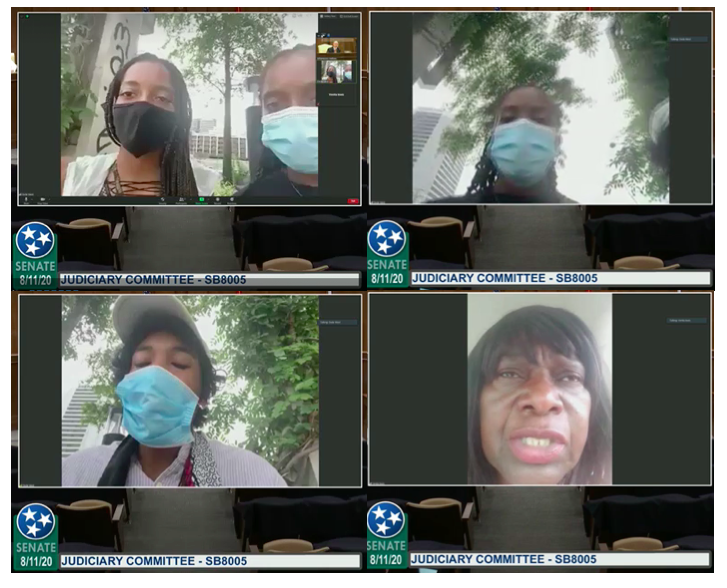 State of Tennessee
State of Tennessee
Four protestors testified via Zoom during the Senate Judiciary Committee hearing Tuesday.
“Well, what did she write?”
That was a question from Sen. Janice Bowling (R-Tullahoma), who is white, to Sen. Brenda Gilmore (D-Nashville), who is African-American. It was the first question Bowling asked when Gilmore told of a 14-year-old girl who had been arrested at a Nashville protest for writing on a sidewalk with chalk.
The exchange came in the Senate Judiciary Committee meeting Tuesday. It was one of several hearings during a special session of the Tennessee General Assembly called by Governor Bill Lee.
The session was called by Lee under the auspices of tackling COVID-19 liability issues for businesses and organizations. But the session also carries a major dose of possible trouble for protesters across the state. The final legislation against protestors is expected to be proposed by Lee, and would bring harsher sentences for vandalism and blocking a highway or street, and would allow officers to collect the personal belongings of those gathered (camping) on state property between 10 p.m. and 7 a.m.
The protest legislation is in response to the two-month, nearly round-the-clock protest on Legislative Plaza, just across the street from the Tennessee State Capitol. Protestors there are calling for reforms in the aftermath of the police killing of George Floyd.
Gilmore brought a bill to the Senate committee that would guarantee the right to peaceful protest in Tennessee. Though several lawmakers pointed out that the U.S. Constitution already guarantees this right, Gilmore said the legislation would have clarified the point in Tennessee law and reminded protestors here of their legal right to assemble.
[pullquote-1-center] However, the discussion was overshadowed by actions of some protesters in Nashville Monday. Sen. Kerry Roberts (R-Springfield) said he was surrounded by a group of protestors as he left his legislative office and walked to a restaurant two blocks away. Roberts said the protestors yelled at him and called him names but did not touch him nor threaten him with violence. He said the scene made it “hard to sympathize” with protestors and hard to have a conversation about issues.
Bowling said demonstrators blocked the exit to the garage where lawmakers park their cars.
[pullquote-2-center] “There was loud talking, signs, and all sorts of things until troopers came and made a safe passage for us to get out,” Bowling said. “There were fists put in our (faces) and people screaming at us, and people getting in the street as we were trying to leave.”
Bowling said she and others were kept safe but forced to stay in the garage for half an hour. This was difficult, she said, because the garage is “not a pleasant place to be” and can get hot and stuffy.
(Floyd was handcuffed, held on the ground and murdered on a Minneapolis street as a one police officer knelt on his neck for nearly eight minutes. Two other officers restrained him while another held the crowd at bay. Floyd begged for his life repeatedly saying, “I can’t breathe.” The arrest and murder came after a store clerk accused Floyd of passing a counterfeit $20 bill.)
“Civility is what we’re losing,” Bowling argued. She said Lee’s legislation, which is expected to be finalized Wednesday, will help “get rid of bad apples” in the protest movement.
Four protestors testified via Zoom during the committee hearing, speaking to Lee’s expected legislation. Justin Jones hoped legislators would address the symptoms of the protests — racial inequality — instead of further criminalizing the protests themselves. He called Lee’s legislation “morally reprehensible.” Lindsey Edwards said protestors have been unable to speak directly with Lee. If they had, she said the protest and the legislation could have been avoided altogether.
Sen. Sara Kyle (D-Memphis) said protestors are frustrated because they are literally locked out of the capitol building, their voices silenced from any decision-making process. She suggested finding an appropriate place for citizens to speak with lawmakers.
In response to Bowling’s question, Gilmore told her she could not remember what the 14-year-old girl wrote. It wasn’t profanity, she said, “it was whatever a 14-year-old girl would write to express herself.”